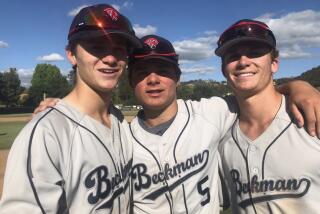The Son Also Rises in Kansas City : Young McRae Has Followed His Own Path to Success
- Share via
KANSAS CITY, Mo. — Some of the best hitters in baseball come to Hal McRae for advice. But he watched in silence while his own son struggled at the plate.
Game after game, little Brian McRae fought back tears and battled his Little League slumps. Hal McRae loves his son very much. He swallowed hard a few times himself and fought the urge to shout instructions.
The youngster got plenty of encouragement. But unlike a lot of kids whose fathers hover over them and preach baseball theory, Brian McRae was left pretty much to his own devices.
It was a classic example of what psychologists call “tough love.” And it may be one reason Brian McRae was drafted No. 1 last month by his dad’s very own Kansas City Royals.
The elder McRae, a 17-year big league veteran, is known for his savvy as much as for his .293 lifetime average. When his playing career is finished, he probably will have the chance to stay in the game as a coach.
But McRae determined many years ago that young baseball players, like thoroughbred colts, must run free and frisky until they find their bearing.
Brian certainly seems to bear out his father’s theory. A switch-hitting infielder with quick feet and a quick bat, he hit almost .400 as a high school senior this spring. A splendid athlete, he also received a football scholarship at Kansas, which probably is going to go begging now that baseball has made him a first-round draft choice.
“I threw to him a lot and got him switch-hitting when he was about 12 years old,” said Hal McRae, who was beaming with pride when the Royals drafted Brian No. 1. “I also taught him to bunt. I thought that was essential. But mechanically, I didn’t bother him much. I wanted him to do whatever he felt comfortable doing, and I wanted him to learn about himself.
“With a young kid, it’s best he doesn’t know a whole lot about mechanics. At the high school level and early on in pro ball, if you can hit, you can hit. You don’t need to be told how to stand or where to hold your bat. As you progress and get into higher levels you’ll need instruction. But early on, a kid needs to fight his own way out of slumps and learn about himself.”
Being the son of Hal McRae will no doubt carry advantages in the intensely competitive world of minor league baseball. For one thing, Brian never is going to be cowed by the glamour and excitement of the big leagues. He was about 8 when he started coming to the park with his father, shagging fly balls with Frank White’s glove and hitting grounders with George Brett’s bat.
But father and son also have discussed the possible disadvantages. They are many.
“It all depends on him and how he handles it,” Hal McRae said. “It could be a disadvantage in the sense that people may expect too much of him, or that he’ll expect too much of himself. It could be a disadvantage if people compare him to me, and that my name will precede his all the time. It could work either way. It’s up to him.”
For the first phase of what he figures will be a minimum of three years in the minors, McRae wants his son to take the same unfettered approach he took as a Little Leaguer.
“The most important thing for him is to avoid trying to be what people expect him to be,” McRae said. “He’s got to try to be himself, to find himself. He’s got to go out and find out what he can do . . . not try to do what I did.”
Is Brian at about the same stage in his development as his father was at 17?
“I don’t know,” Hal McRae said with a smile. “That’s a comparison with me, and we’re not going to do that.”
More to Read
Go beyond the scoreboard
Get the latest on L.A.'s teams in the daily Sports Report newsletter.
You may occasionally receive promotional content from the Los Angeles Times.










